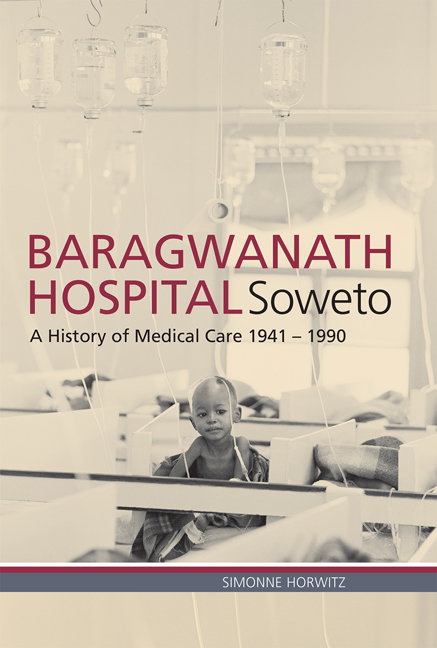Book contents
- Frontmatter
- Contents
- Acknowledgements
- List of Illustrations
- List of Abbreviations
- A note on terminology
- 1 Introduction: A Hospital in Soweto
- 2 From Allied Military Hospital to Urban African Hospital
- 3 Apartheid and Administration: The Hospital, Provincial Administration and the University of the Witwatersrand
- 4 Missionaries, Clinicians, Activists and Bara Boeties: The Doctors of Baragwanath Hospital
- 5 Black Nurses in White: The Nurses of Baragwanath Hospital
- 6 Chronic contradictions: The struggle of Baragwanath in the 1980s
- 7 Baragwanath's Transition and Legacy
- Bibliography
- Index
- Plate Section
4 - Missionaries, Clinicians, Activists and Bara Boeties: The Doctors of Baragwanath Hospital
Published online by Cambridge University Press: 20 April 2018
- Frontmatter
- Contents
- Acknowledgements
- List of Illustrations
- List of Abbreviations
- A note on terminology
- 1 Introduction: A Hospital in Soweto
- 2 From Allied Military Hospital to Urban African Hospital
- 3 Apartheid and Administration: The Hospital, Provincial Administration and the University of the Witwatersrand
- 4 Missionaries, Clinicians, Activists and Bara Boeties: The Doctors of Baragwanath Hospital
- 5 Black Nurses in White: The Nurses of Baragwanath Hospital
- 6 Chronic contradictions: The struggle of Baragwanath in the 1980s
- 7 Baragwanath's Transition and Legacy
- Bibliography
- Index
- Plate Section
Summary
Baragwanath Hospital was a difficult place in which to work. For much of its existence, its overcrowded, understaffed wards were, in the words of one of its doctors, David Seftel, ‘a cacophony of voices and sick sounds, a theatre of the bizarre and the absurd which was sometimes difficult to imagine as a place of healing rather than a carnival’. It was considered by many to be a ‘backwater’ hospital, often referred to disparagingly as ‘that place beyond Uncle Charlie's’ (the roadhouse that came to mark the end of Johannesburg and the beginning of Soweto) and spoken of as playing second fiddle to the older, more established white hospital, the Johannesburg General. Asher Dubb said that ‘the medical school hierarchy was concentrated on the Johannesburg Hospital, that was seen as the flagship … There was a perception, which I personally think was exaggerated, that Bara was the poor relation’.
In contrast many Baragwanath doctors, including some world-class specialists, talked about the hospital in glowing tones. They stressed that Baragwanath was a unique and special place to work in, one that offered unparalleled opportunities for professional and personal growth. Then there were others for whom Baragwanath, and the type of medicine practised there, chimed well with their political and social identity.
Patients, pathology and physicians
Baragwanath could not rival Johannesburg General Hospital's research funding and resources. The third superintendent, WHF Kenny, who served from 1963 to 1969, put it as follows: ‘Baragwanath Hospital has no research appointments and no research funds other than those private contributions gleaned by enthusiastic members of staff. There are no departmental typists and no tape recorders; records are liable to get lost.’ Two decades later there were still major discrepancies between resources at the two institutions. As David Seftel was later to say, ‘At Jo'burg there were armies of people helping you, at Bara you had to draw blood yourself and get it 500 metres from the ward to the lab. You had to run it there and then back to your patient. This was health care on the edge where patients’ survival was based upon your own physical agility as much as your mental acumen.’ Despite these deficiencies, David Seftel perceived Baragwanath as an advantageous site for important medical innovations and developments, ‘the classic case of ingenuity in the face of adversity.
- Type
- Chapter
- Information
- Baragwanath Hospital, SowetoA history of medical care 1941–1990, pp. 86 - 118Publisher: Wits University PressPrint publication year: 2013



